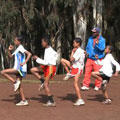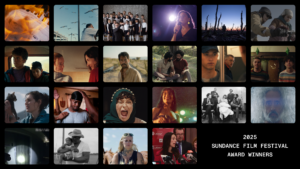Jerry Rothwell at Imperial High School in El Centro, California.
Jerry Rothwell
Jerry Rothwell is a British documentary filmmaker. He joins Film Forward in Imperial Valley to screen and discuss his latest film, Town of Runners.
“You going to El Centro?” says the immigration officer at LAX, “Why you going to El Centro? There’s nothing there.”
El Centro is the urban region of Imperial Valley in southeastern California, bordering with Mexico. I’m here for the next week to show Town Of Runners with the Film Forward program. We’re screening in schools and communities on both sides of the border – an area that doesn’t get much in the way of independent cinema.
Our first screening is at Imperial High School—a group of maybe 100 sports and arts students. I always worry Town Of Runners is a film that might seem quite inaccessible to 14-16 year olds—it has subtitles, it’s 85 minutes long, it’s set in a country many of them haven’t heard of—but I’m always impressed by how engaged young people become with the story.
The cultural differences don’t seem to be a barrier, because the film is about characters who are the same age as the audience. Teenagers are caught in the same dynamics the world over – between childhood and adulthood, between their parents and their own sense of self, between their ambitions and their growing realizations about the world they have been born into.
Before the film we asked what words the students associate with Ethiopia. Along with the usual phrases like ‘poor people’ and ‘famine,’ there were some that were surprising: ‘World War II,’ ‘Jamaica,’ ‘ethnic cleansing,’ ‘old.’ Most of these could have a strong Ethiopian connection.
The Italian invasion of Abyssinia in the mid-’30s was an important moment in the build up to the WWII; rastafarianism in Jamaica looked to Ethiopia and Haile Selassie for its roots; there are still strong ethnic tensions in the country; and Ethiopia is old in the sense that it’s the crucible of human life, where the first human skeletons were found. Our sense of a country is often built on islands of facts we pick up like these. Hopefully a film can take you inside a culture, see it from the point of view of its people—and that’s what Film Forward is all about.
When we asked the same question at the end of the film, the words that came out were all to do with human attributes—determination, ambition, hard work. In an area where many young people come from migrant families moving from country to city, perhaps there was a recognition of the desire of Hawii and Alemi (the girls in the film) to use running to take them to a different life from the agricultural work of their parents.
Afterward the conversation with some students moved to their own ambitions—one boy told me how his thing was dance. He’d got into it in order to impress a girl. The girl had moved on, but the dance had stuck. “It’s good to know about others pursuing their dreams”, he said.
So in response to the immigration officer, like anywhere where there’s people trying to make a future, there’s a lot going under the surface in Imperial Valley.




